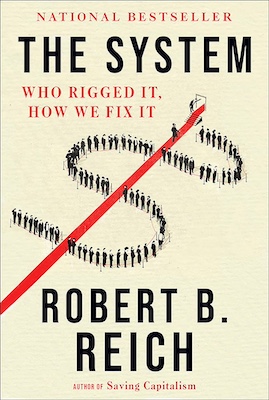The System by Robert B. Reich
Who Rigged It, How We Fix It
This book got me angry at times. The level of injustice and the gaslighting of people with free market natural and inevitable order is horrifying.
I can recommend it.
Some of the ideas I've picked:
- There is nothing natural in the market. It's just a set of rules for the involved to follow.
- Ayn Rand "market fundamentalism" creates a false narration that your wealth and income are your worth.
- CEOs get a raise of 960% from 1980 till 2019 while normal people around 12%.
- Maximizing shareholder value was caused by corporate raiders and didn't lead to anything good.
Quotes #
One of the most dangerously deceptive ideas is that we work and live in a free market that is neutral and natural—existing outside government, unaffected by how power is allocated in the system. We are repeatedly told that whatever inequalities and insecurities the market generates and whatever negative consequences it causes are beyond our control. Efforts to reduce inequality or insecurity are described as constraints on the market’s freedom, likely to cause grave unintended consequences. In this view, if some people aren’t paid enough to live on, the market has determined they aren’t worth enough. If others rake in billions, they must be worth it. If millions of Americans are unemployed or their paychecks are shrinking or they work two or three part-time jobs with no idea what they’ll earn next month or next week, that’s just the natural outcome of market forces. If the planet’s survival is endangered because of fossil fuels, nothing significant can be done about it. Government shouldn’t intrude because the free market knows best.
But starting in the 1980s, as a result of the takeovers mounted by Icahn and a few other raiders such as Michael Milken and Ivan Boesky, a wholly different understanding about the purpose of the corporation emerged. The system changed profoundly. Raiders targeted companies that could deliver higher returns to shareholders mainly by abandoning their other stakeholders—increasing profits by fighting unions, cutting workers’ pay or firing them, automating as many jobs as possible, abandoning their communities by shuttering factories and moving jobs to states with lower labor costs, or simply moving them abroad. The raiders pushed shareholders to vote out directors who wouldn’t make these sorts of changes and vote in directors who would (or else sell their shares to the raiders, who’d do the dirty work).
Through it all, Americans have clung to the meritocratic tautology that individuals are paid what they’re worth in the market, without examining changes in the legal and political institutions that define the market. This tautology is easily confused with a moral claim that people deserve what they are paid. Yet this claim is meaningful only if the system’s legal and political institutions are morally just. It has lured us into thinking nothing can or should be done to alter what people are paid because the market has decreed it. By this logic, the oligarchy is natural and inevitable.
The modern equivalent of the divine right of kings might be termed “market fundamentalism,” a creed that has been promoted by the American oligarchy with no less zeal than the old aristocracy advanced divine right. It holds that if the free market has caused a few at the top to aggregate vast wealth and power, the result must be right and good because it is natural and inevitable. One of market fundamentalism’s founders was the philosopher Ayn Rand. Former Fed chair Alan Greenspan was a follower of Rand, and, as we’ve seen, his doctrinaire views almost sank the American economy. Today’s oligarchs are not as rigidly doctrinaire, but they still regard the economy as a holy grail.
As I’ve said, the oligarchy wants Americans to view the system as a neutral meritocracy in which anyone can make it with enough guts, gumption, and hard work. The standard platitudes of market fundamentalism are that people “pull themselves up by their bootstraps” and that America is a nation of “self-made men” (and women), both of which translate into a moral code: People deserve whatever they earn in the market. Income and wealth are measures of worth. If you amass a billion dollars, then you must deserve it because that’s what the market awarded you. If you barely scrape by, then you have only yourself to blame. It is assumed that the system, and how power is allocated within it, plays no role whatsoever.
Want to learn more?
Sign up to get a digest of my articles and interesting links via email every month.
